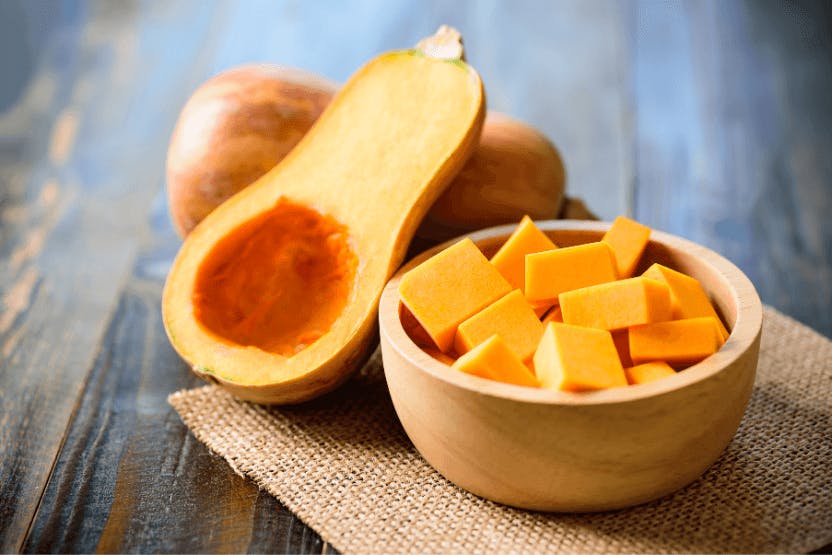
By Emily Bayne
Published: 06/12/2024, edited: 06/16/2024
Reviewed by a licensed veterinary professional: Dr. Linda Simon, MVB MRCVS
Save on pet insurance for your pet
You don't have to choose between your pet and your wallet when it comes to expensive vet visits. Prepare ahead of time for unexpected vet bills by finding the pawfect pet insurance.
Overview
Is butternut squash safe for cats to eat? Yes!
Although cats are primarily meat eaters, they do benefit from eating some fruits and veggies, and butternut squash is no exception! Butternut squash isn’t as common in commercial cat foods as other veggies like corn, beets, and green beans, but occasionally, you will see it in wet foods and treats.
Read on to learn about the health benefits of offering butternut squash to your kitty as well as recommended serving size and some things to consider when feeding squash to your feline friend.
Do cats like butternut squash?
Cats are notoriously picky, and food preferences vary from cat to cat, so some cats enjoy butternut squash, and others do not. Butternut squash has a slightly sweet flavor which might not be appealing to some kitties. Cats rarely show interest sugary foods because the taste receptors responsible for detecting sweetness aren't very sensitive.
If you're interested in serving butternut squash for its nutritional benefits, you may want to cook it soft and blend it with meats or wet cat food to encourage cats to eat it.
Health benefits of butternut squash for cats
Although veggies aren't a necessity in your cat's diet, they still have many benefits when served in moderation.
Fiber
Some experts recommend feeding butternut squash to felines to help combat mild constipation since it is high in fiber and helps with digestion.
Vitamin A
Butternut squash is also high in Vitamin A. Vitamin A is essential for many feline bodily processes and impacts your cat's vision, nerves, skin, and growth. Too little vitamin A can cause cats to develop night blindness, poor coat health, and have stunted development.
Potassium
Just two tablespoons of butternut squash has a whopping 73 mg of potassium, essential for your kitty's muscle, brain, and heart health.
Low fat
Butternut squash can be a calorie-conscious addition to your cat's regular food since it is low in fat but packed with nutrients.
Magnesium
Butternut squash is an excellent source of magnesium, which is crucial for a feline's urinary, muscle, and cardiovascular health. In fact, too little magnesium can cause a life-threatening condition in cats called hypomagnesemia.
Calcium
You might be surprised to learn that butternut squash contains a pretty substantial amount of calcium—84 mg per cup! Calcium is crucial for cats of every lifestage since it helps strengthen bones and aids in healing.
High water content
Butternut squash has a high water content, so it can help boost hydration — this can be especially helpful for cats who don't drink enough or struggle to stay hydrated.
How much butternut squash can I give my cat?
It's best to give cats no more than two tablespoons of butternut squash a day. Moreover, butternut squash and other treats should not constitute more than 1/10th of your cat's food. Commercial cat food is formulated with the exact macro- and micronutrients cats need for optimal health, and consuming too many calories from other food sources could cause weight gain or malnutrition.
Can cats eat butternut squash soup?
If you're wondering if your kitty can safely indulge in a dish of butternut squash soup, the answer is that it depends. Unseasoned boiled or baked butternut squash blended with water or cat-safe broth is paw-fectly fine for your cat. However, heavily-seasoned or dairy-based soups can cause digestive upset, as can flavor additions like onion and garlic.
Are there dangers of overfeeding my cat butternut squash?
Too much butternut squash may be difficult for your furbaby to digest and could potentially cause nausea, vomiting, and diarrhea.
Will butternut squash help with my cat's constipation?
Yes! Cooked butternut squash is a great remedy for mild constipation in cats because it is high in fiber and moisture.
When prepared correctly, butternut squash can be a tasty and nutritious addition to your cat's diet. Experts recommend baking, boiling, or steaming the squash until soft before serving. Since it is mild in flavor, it works well when blended with wet food, which can encourage picky eaters to try it when they otherwise might not. It's best to keep your cat's butternut squash intake down to a tablespoon or two a day since too much can cause tummy troubles.
Digestive problems and food allergies can be expensive to treat. Compare pet health insurance plans to save more than $270 a year on vet care.
You may also like
